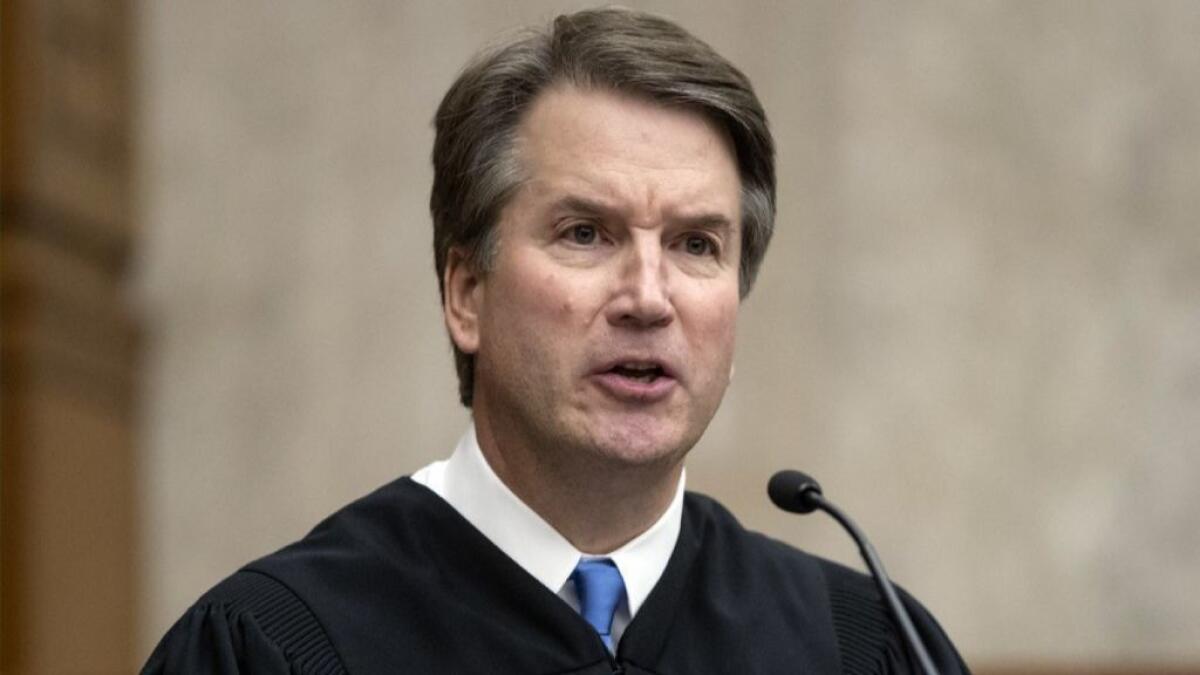Op-Ed: The simplest reason to oppose Brett Kavanaugh

- Share via
Democrats in the Senate are in need of a good reason to oppose President Trump’s nomination of Judge Brett Kavanaugh for a seat on the Supreme Court. Or at least they need a reason, and a good one would be nice. So far, at least, the search for a character flaw (except for excessive ambition, which comes with the territory) has been unsuccessful. In arguing against this candidate, the Democrats may then have to resort to their real reason, which is justifiable concern that he is an extreme right-winger who will, if allowed to do so, produce right-wing rulings that liberals will detest.
Absurdly, however, our traditions constrain senators who wish to expose the nominee’s beliefs, and make it easy for the nominee to conceal them.
It is not considered kosher for senators to find out what nominees think about previous court rulings, such as Roe vs. Wade, by the simple expedient of asking them.
If a senator does ask a direct question, the nominee can lie in answering — “Roe vs. Wade? Great decision, Senator. One of my all-time faves” — and there’s not much we can do about that. But even with lifetime tenure, a justice might prefer not to be branded as a brazen liar. Nominees are, then, much more likely to choose the path of obfuscation.
Of course Kavanaugh, like every other nominee, has in fact prejudged the abortion issue and all others of any importance.
Kavanaugh no doubt already has his statement memorized. Something like this: “Senator, it would be improper for me to answer that question because the answer might be misinterpreted as suggesting that I have prejudged an issue, which is something I would never ever ever do.”
Of course Kavanaugh, like every other nominee, has in fact prejudged the abortion issue and all others of any importance.
The typical Supreme Court nominee is a lower federal court judge who has ruled in hundreds of cases on dozens of topics. By the time a president nominates him or her, he or she has prejudged every one of them. And what about the eight sitting justices? In their tenures they have prejudged, judged and re-judged all sorts of controversial subjects. Although they should be open-minded, it is ridiculous to suggest that they are in some virginal relationship with the truth that makes it improper even to ask the only questions anyone cares about.
Kavanaugh may if necessary admit to being a conservative. Like all Republican presidents, Donald Trump says that is what he wants and in Kavanaugh he has found one, he thinks. But the word “conservative” can mean different things to different people (or, in fact, different things to the same people). It obscures more than it illuminates.
Is a conservative someone whose core belief is that courts should follow precedents, be slow to change established laws — even laws that a judge may disagree with? Would a conservative vote to overturn Roe vs. Wade, for example, or would he or she reason that abortion rights are now so embedded in society and law that it would be “activism” for a judge to meddle with them?
Enter the Fray: First takes on the news of the minute from L.A. Times Opinion »
Or is a conservative — at least in the legal context — someone who feels most strongly that the laws and the Constitution should not be used to impose a judge’s political preferences? This is what Justice Antonin Scalia called “originalism.” This kind of conservative would say about abortion, “Find it for me in the Constitution, buddy.”
Yet another type of conservative would say (not out loud!) “Look — we’re in power; we won’t always be in power: why shouldn’t we impose conservative policies on the country? The libs did it when they had the chance.” This crowd would probably try to impeach Justice Kavanaugh if he didn’t vote to overturn Roe vs. Wade.
Although liberals hope that if Kavanaugh is confirmed he will turn out to be the first kind of conservative, why should I, or any other citizen, have to guess? “That’s for me to know and you to find out” is not a good enough answer.
So, having asked, and being lied to or stonewalled, are senators entitled to vote against a nominee for the simple reason that his or her legal views are assumed to be far from their own? This also is considered un-kosher, but senators shouldn’t care about the bizarre rules of etiquette that govern these confirmation festivals.
Michael Kinsley is a contributing writer to Opinion.
Follow the Opinion section on Twitter @latimesopinion or Facebook
More to Read
A cure for the common opinion
Get thought-provoking perspectives with our weekly newsletter.
You may occasionally receive promotional content from the Los Angeles Times.









